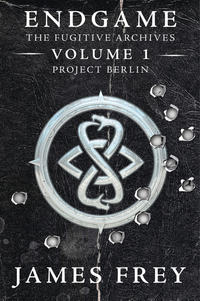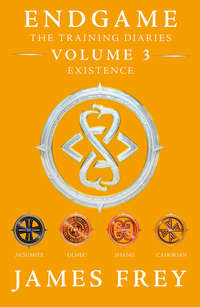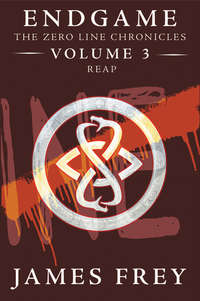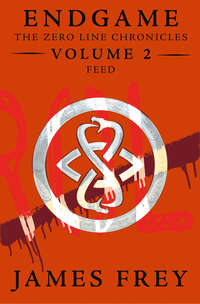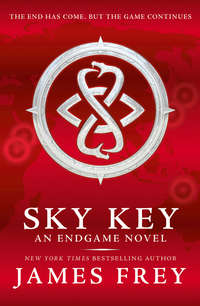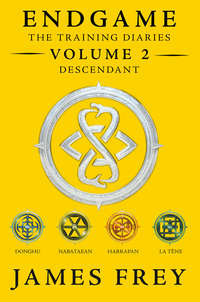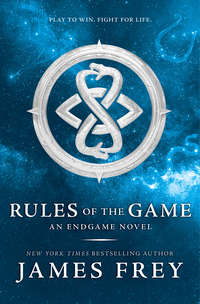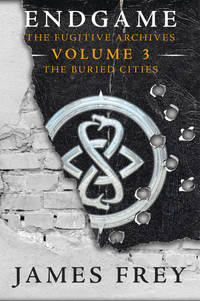
Полная версия
Feed



Copyright
First published in ebook in Great Britain by HarperCollins Children’s Books 2016
HarperCollins Children’s Books is a division of HarperCollinsPublishers Ltd
1 London Bridge Street, London SE1 9GF
www.harpercollins.co.uk
Endgame: The Zero Line Chronicles: Feed © 2016 by Third Floor Fun, LLC
Cover design and logo by Rodrigo Corral Design
Additional logo and icon design by John Dismukes
James Frey asserts the moral right to be identified as the author of this work
A catalogue record for this book is available from the British Library.
All rights reserved under International and Pan-American Copyright Conventions. By payment of the required fees, you have been granted the non-exclusive, non-transferable right to access and read the text of this e-book on screen. No part of this text may be reproduced, transmitted, down-loaded, decompiled, reverse engineered, or stored in or introduced into any information storage and retrieval system, in any form or by any means, whether electronic or mechanical, now known or hereinafter invented, without the express written permission of HarperCollins.
Source ISBN: 9780062332714
Ebook Edition © April 2016 ISBN: 9780007585298
Version: 2016-04-07
Contents
Cover
Title Page
Copyright
Chapter One
Chapter Two
Chapter Three
Chapter Four
Chapter Five
Chapter Six
Chapter Seven
Chapter Eight
Chapter Nine
Chapter Ten
Chapter Eleven
Chapter Twelve
Chapter Thirteen
Chapter Fourteen
Excerpt from Endgame: The Calling
Marcus Loxias Megalos
Chiyoko Takeda
About the Author
Books in the Endgame Series
About the Publisher
CHAPTER ONE
I knelt in the rocks, sharp stones digging into my knees and shins, and placed the bomb. It was small, about the size of two bricks, and was contained inside a cardboard box. There wasn’t much to it: a chunk of C4—a plastic explosive with the consistency of soft clay—a few components of an alarm clock, and four D-size batteries. I took the two wires from the clock, twisted them onto the leads of the detonators—short metal cylinders. I pushed the detonators into the C4.
C4 was supposed to be extremely stable—you could drop it or shoot it or rip it in half, and it wouldn’t explode. It needed an electric current to detonate. And I’d just given it that electric current. It was ready to blow, and sweat dripped down my forehead onto my nose and into my eyes.
This wasn’t the first time that I’d done this: I’d prepped a dozen practice bombs, where the C4 was replaced with Play-Doh. This was the first time I’d done it for real, though: real batteries, real detonators, real explosive. My fingers trembled with every step.
I looked over at Kat. She was older than me by five years: 24. She was tall and pretty, with brown hair that shone like copper in the evening sun. Eugene was with her, the two of them unrolling a tarp that had been painted with a thick and heavy coat of thermite. The design was a spiraling series of rectangles—the logo for the Munich Olympics. At the bottom was painted “9-5-1972.”
This was how we would “invite” the Players to meet with us. John and Walter didn’t know for certain how a real Calling worked. Walter had said that the Cahokians believed that there would be a sign from heaven—possibly something violent. The only thing they knew for sure was that it would be unmistakable, and the Players would know where they were to gather. So we’d use bombs to get their attention, and use the thermite to burn the Olympic logo into the ground.
When they had the tarp unrolled, Eugene unrolled the fuse and pulled out a lighter.
I hit the timer on the clock, and it started to count down.
I stood up and walked to them. Eugene touched the unlit lighter to the fuse, and we all headed for the trees. As we walked, Bakr, the man who’d made the bombs, walked past me, heading toward the bomb to check it.
Eugene held his hand out to me, and I slapped it, reluctantly.
“Nice job, man,” he said.
“Let’s see what Bakr says,” Kat said, stopping at the tree line and turning around.
I looked back at him, 30 yards away in a natural low spot in the forest. It was muddy in the middle, which we’d worked around, but he had boots on and walked right through the mud, just as he’d done for the other groups who had practiced this exercise. We were now the eighth group to practice with the real equipment. Four more to go. All the Zero line members were getting their chance, because practicing with Play-Doh was one thing but sticking detonators into real C4 was something completely different. I hadn’t expected to be so intimidated by the bomb.
Bakr turned around and gave a thumbs-up sign. I’d done it right.
“Nice job, Mike,” Kat said, and squeezed my arm.
“We’ve rehearsed this enough,” I said. “I should be able to do it in my sleep.”
Walter spoke without looking at me. “Don’t get cocky. Forget a single step in there and you could blow yourself to hell.”
“I know,” I said. “That’s not what I meant. I’m just saying we’ve practiced enough. We’re ready. As ready as we can be.”
“You and your team need to be a well-oiled machine,” John said.
Then why is Eugene with me? I thought. The whole group blamed Eugene for Tommy’s death—at least I assumed they did. It was obvious in the way they talked to him, talked about him, and spoke about Tommy. Eugene screwed up and Tommy had died. And now I was in a squad with him and Kat.
I sat down on the hillside next to Mary. Why we’d gotten split up, I couldn’t explain. We had grown so close throughout the summer spent on her family’s ranch. We each knew how the other thought, how we’d respond in any given situation. But she was leaving with Bruce—just the two of them—going after the Olmec.
“Nice job,” she said as I sat.
“It’s easy,” I replied. “Like I said, we’ve done it so much.”
“But this time the bomb is real. Come on, I had my turn, and it wasn’t the same thing at all. I kept freaking out that there was going to be a spark—from the clock wires, or even the static electricity in my clothes. Nerves, you know?”
“Yeah,” I said. “Nerves. I think we’ve all had our final turns. No more until the real deal. How’s the weather in Veracruz this time of year?”
“Shut up,” she said, and laughed a little. “It’s not like this is a vacation.”
“You get to go to the beaches of Mexico, and I get to go to Istanbul and Baghdad.”
“It’s going to be hot.”
“You think Baghdad isn’t?”
“It’s probably more humid in Mexico.”
Kat squatted down next to us and laughed. “You can wear a bikini in Veracruz. I have to wear a hijab in Baghdad’s heat.”
Bakr took the disassembled bomb to the west side of the depression, and Bruce and Eugene rolled the tarp up again and then hauled it back to the bomb. Bakr had grown up in Baghdad—one of the cities Eugene, Kat, and I were going to, but he wasn’t part of our team. He said he didn’t want to be accidently recognized.
“Rodney, Jim, Julia,” John said. “You’re up.”
Jim was right behind me, and he stood up.
“Last time,” John said to him. “We’re off to Reno tomorrow, so make it count.”
Reno tomorrow. That gave us a week before the meteor would come and we’d have to go off to plant the bombs—to send the invitations to the Calling. It would only be a few more weeks before we were all reunited in Munich at the Olympics.
Weeks that I would be away from Mary. Weeks that Bruce would spend pretending to be her boyfriend, on a vacation on the sapphire shores of Mexico, drinking margaritas and tequila, and—
“What are you thinking about?” Mary asked.
Fifty yards away from us, Julia had picked up the bomb and Rodney and Jim were carrying the tarp into position.
I kept my voice low. “I think you should ask John to swap you out for Kat. Or Eugene—even better.”
She didn’t immediately answer. She leaned back on her elbows, watching the bomb being moved into place.
I knew what she’d say by this point. We’d been over it a dozen times.
“Mike,” she said, a sigh in her voice.
Walter reached over and smacked me lightly in the head. He wasn’t quiet when he spoke. “Get over it already. We’ve been practicing in these groups for six weeks. I’m not going to change it at the last minute. You have the streets of Istanbul memorized. You learned conversational Turkish. You need to worry about the plan now, and about your love life later.”
“I don’t speak Turkish. I’ve learned how to count to ten and how to ask directions to the hotel.”
John looked at me. “We’ll all be back together soon.”
“I just think that Mary and I work well together. Look,” I said, pointing at the group planting the bomb and tarp. “Jim and Julia are staying together.”
“Because they know how to work together,” Walter said, his tone cold as ice. “You don’t. You think you do, but in every combat exercise we did, you’d ignore mission objectives to defend Mary.”
“So you’re putting her in a different unit so I’ll be less worried about her?” I said rhetorically. I knew his answers.
“We’re saving the world. We have to make sacrifices. You’ve never seemed to understand that.”
“I don’t understand that?” I said, standing up. “Are you fucking kidding me? I’ve given up all my life’s goals. I gave up my admission to Berkeley. I gave up my life savings. I killed a man for Christ’s sake. I’ve given it all up, and you can’t cut me a little slack.”
“Quiet,” John said, watching Julia kneeling next to the bomb.
“I asked to be on a different team,” Mary said. “You know that.”
“I know. And I’m asking for you to change your mind.”
“It’s too late to change,” John said. “Even if she wanted it. She knows Spanish. Four years in school. Bruce does too. Not to mention all of the intel she’s memorized—and the intel you’ve memorized. Tell me, where in Veracruz is the best place to find black-market guns? The best place to hide if the police come after you?”
“I don’t need to know it. Mary already does.”
“What if she gets shot?”
Then what’s the point? I thought. I believed in Zero line’s goals, but I had my priorities, and Mary was placed above the mission.
Walter spoke. “Where do you get the bomb and tarp in Turkey?”
I ignored him.
“I’m asking you a question, Mike. Where do you get the bomb in Turkey?”
I glared at him. “The Fethiye fish market, from an anchovy dealer named Salomao.”
“And what’s it going to be packaged in?”
“A case of fish with a false bottom. Look, I know what you’re getting at.”
“Then shut up,” Walter said.
Mary looked at me and took my hand.
Something inside me wondered if I was losing her. Yes, I did defend her. Of course I would. I wasn’t an unfeeling bastard like Walter. If chasing down Players meant leaving Mary on her own, of course I would stay with her.
I knew the Players were tough—Walter and Agatha had drilled that into us—but we would operate as a team. In every practice—the daily runs and obstacle courses, the shooting drills, the bomb practice, the sales dialogues—we were a team, and we stuck together. The only times where I changed the plan and defended Mary were when there was an error: when we were attacked from behind, or when we lost radio communication. That wasn’t a reason to tear Mary and me apart. It was adapting to the changing conditions.
Julia stood up from the bomb, and Rodney touched the fuse with his unlit lighter.
Bakr once again trotted out to disassemble the bomb, readying it for squad nine, which was just John by himself. John and Walter were taking on their jobs alone. We had so few of us that this was the only option. Groups of three—like me, Eugene, and Kat—had two targets to hit. Others had just one.
I squeezed Mary’s hand. I wanted all of this to be over.
John stood up. “We’re leaving for Reno tomorrow afternoon. We have more practice ahead of us before our flights next week. And we’ve scouted out a good place to watch for the meteor.”
CHAPTER TWO
“We still have more training we need to do,” Walter said. All of us were back in camp, except for Tyson, who was staying out front guarding the gate. “We’ve started surveillance training, but we need to do it in a city environment. We need to teach you how to follow people, both in a car and on foot. So we’re going to hit it hard this week—we’ll need this to track down the Players when they get to Germany.”
Rodney spoke. “I know we’ve been over this already, but are we really sure about this? Does that meteor affect our plans? My squad is supposed to go to the Aksumite compound first. Ethiopia. That’s on the other side of the world. They wouldn’t have seen any meteor.”
“It’s a trigger event,” Walter said with a hint of anger. “It would make the news, and this is what the Cahokian line believed would be the signal. A big natural event. It could have been an earthquake in Rome or a tsunami in Japan. Some big event that sets everything into motion. Nature is sending us a big break, but now it’s our turn to use it and send out these invitations to the Players.”
“But why bombs?” Lee asked. He was smiling—obviously not concerned about the morality of bombing anyone. After all, he’d been the one to design the thermite and smuggle all the bombs out to our destinations. “We want to call them, not kill them, right?”
“It’s what Walter knows and Agatha described,” John said. “She said that the invitation would be violent. It sends a message.”
“Speaking of which,” Henry said, “why does the La Tène get a free pass? Why aren’t we stopping him?”
“We’ve been over this before,” John said. “Agatha said she’d handle it. We have to trust her. She has no reason to betray us since she’s been excommunicated by her line.”
“And remember,” John said, “our goal is not to kill these people. We’re stopping them. We’re going to, hopefully, enlighten them.”
“And more importantly,” Walter said tiredly, “as I’ve said a hundred times: this is not a real Calling. It takes more to win Endgame than just killing the other competitors. You have to follow clues and solve a puzzle. Even if Agatha is lying to us about the La Tène Player, he couldn’t win anything.”
Henry stood up and started to pace. “Do we know that? This meteor is a big deal. Too big, I think. How do we know it won’t set off a real Calling and game?”
“All the more reason to hurry,” John said.
“Right,” Walter said, “let’s just worry about the task at hand. We have a lot to do, every one of us, and it’s going to be dangerous and deadly serious. We can’t lose sight of what we’re about to do. We need to get to Reno, train there, and then get moving.”
Henry waved his hand dismissively.
“Don’t be discouraged,” John said. “We know that there will be problems. We just need to remember that there’s twenty of us and eleven of them. We’re luring them onto our turf. They’ll all be on their guard, but they’ll be waiting for the other Players at that sunburst plaza. They won’t be ready when we knock on their doors, wanting to talk. Yes, we’ll have guns, bombs, anything we need, but that’s the backup plan. The ideal is that we convince them all, and they walk away.”
“And if someone turns on us?” Henry asked. “You’ve made them out to be killing machines.”
“They’re also very savvy. Smart, tactically and strategically. A good argument, well made, could do wonders,” said John. “Yes, there are some vicious sons of bitches in the group. For them, a bullet might be the only solution. But most of them should listen to reason.”
I walked to the supply tent—it wasn’t so much a tent as it was a waterproof shelter built of tarps—and got a couple of boxes of 7.62 ammo. Ever since the gun-store robbery, I hadn’t been able to sit still. I needed to be doing something, and sitting around camp wasn’t one of those things.
Shooting helped, sometimes. I practiced almost entirely to fire at long range; the precision and concentration that it required helped drive thoughts of the sheriff out of my mind. I could hear someone coming up behind me.
“Hey, Mike.”
“Mary,” I said, and smiled for the first time all day.
“I caught the tail end of Henry’s rant. Can’t take these bullets on the plane. Well, not as carry-on, at least,” she said, with a quick smile.
She set down a box of 9 mm hollow points and pulled her Beretta from her hip.
I pulled the ear protection down into place. I picked a target at 200 yards, and took the straight-forward stance that Walter had recommended to me months ago. I made sure Mary had earplugs in before I let off my first round. The target was a one-inch sheet of steel. I’d hit it hundreds of times by now. It took me about five minutes to go through each shot: gauge the wind, adjust for the falling bullet. Mary, on the other hand, emptied her magazine into a target at 30 yards.
When we were out of ammo, she pulled her earplugs off and draped them around her neck like a necklace. She put her arm in mine, interrupting my reloading of the magazine. I set the M14 onto the hastily constructed plywood table.
“I’m still not happy we’re not going to the same place for these invitations,” I said. “I don’t care what Walter and John say.”
“I know, Mike. I know,” Mary said, exasperated.
“Do you think the thermite will work?” I asked.
She shook her head. “Barbara told me about it. Supposed to light up like fireworks. So I guess we’re going to the Olympics, huh?”
“I don’t think we’ll have much time to watch anything.”
“We might,” she said. “Once the Players are stopped, we’ll have won. We can do whatever we want.”
Mary took the binoculars from the table and spotted for me while I shot at the 300- and 400-yard targets. I was getting so much better with the rifle—I was one of the best in the group, beating everyone except the recent war vets: John, Walter, Bruce, and Henry. In all honesty, I was better than Bruce, but I had decided not to talk about it, as cranky as he was. He’d learned to shoot during Vietnam, but he’d served in the Navy, in the engine room of a destroyer, and never had the need to use his shooting skills after basic training.
I took aim at the 300-yard target through my scope, exhaled slowly, and squeezed the trigger.
“Hit,” Mary said. “Upper left shoulder.”
The target was just a chalk outline drawn on the trunk of a thick pine tree. I adjusted my aim and fired again.
In the instant I pulled the trigger, my mind was back in Redding, in the gun store where Tommy had been killed. The chalk outline on the tree was no longer a chalk outline but the image of the sheriff, his blood spouting forth from his chest, neck, and head. I closed my eyes to get rid of the image, but it was still there—it was always there. I hadn’t told anyone about it, but Mary had to know, right?
“Hit,” she said. “Center of the chest. Kill shot.”
My heart was pounding, and I began to sweat as I sighted the target once more. I could feel my hands trembling, and the crosshairs on the sight were dancing around the tree. I blinked and the sheriff was back.
Morris, I’ve been trying to get you on the horn for ten minutes. What’s with this call I got about gunfire …
Tommy was lying on the floor. The huge blast of buckshot that had come from Morris’s sawed-off shotgun had killed him immediately—no time to suffer, or move, or speak. I had been hit in the shoulder, and I could still feel the dribble of blood.
I fired the gun again.
“Whoa,” Mary said with a smile in her voice. “Way off to the left.”
I tried to hold my hands steady. I didn’t know how Bruce and Eugene were able to shrug it off. Bruce had killed Morris, and the guy who shot Tommy.
I fired again, and a chip of bark blew away two feet above the outline’s head.
“I can’t do it, Mary,” I said, dropping the gun onto the ground and standing up.
“Now you’ll have to resight the scope,” she said, picking up the rifle.
“Didn’t you hear me? I can’t do this!”
“Just practice,” she said. “You can do it. You’ve been beating everyone in camp for weeks. You’re beating me, and I grew up with guns. I had my first twenty-two when I was ten, and my dad had been teaching me to shoot his guns since I was seven. And as of our last competition, you came in third place out of twenty.”
“That was a fluke. So what if I shoot like this when we’re in Munich? What if I’m shaking so hard I can’t even look through the scope? I’m supposed to be a sniper. At this rate I’ll kill our own people who are down on the ground.”
“Two bad shots don’t make you a bad sniper. You probably just need water and something in your stomach.”
“I see him every time I shoot,” I said.
Mary was quiet. She was looking down at the rifle in her hands, checking the scope to see if it was damaged.
Without looking at me, she said, “I know you do.”
“How am I supposed to live with that? And don’t tell me that it’s better to kill one person than lose billions, because I’m so sick of John saying that. The Players are legitimate targets—we need to stop them. Even kill them if they don’t listen to us. That sheriff was one of the good guys. He didn’t need to die. He shouldn’t have even been there. Damn Eugene.”
“I agree,” she said simply. “It was Eugene’s fault. I worry every day about you and Kat. Kat’s smart, but Eugene is a screw-up. He’ll get you killed if something doesn’t change.”
“Well, we’re out of time for things to change. The meteor can’t be postponed, and that means that we have to send the invitations.”
“We have time. The Olympics don’t start for another two weeks.”
I took the rifle back from her and aimed at the closest target—a white fir with a big red dot spray-painted on the trunk. It was only 25 yards away. I fired.
“Wide right,” Mary said.
I fired again, aiming to the left of the tree trunk.
“Hit,” she said.
I fired again. And again. And again until the magazine was empty.
CHAPTER THREE
It didn’t take long to break camp and load our equipment. We left the tents and the rest of our camping gear—our Coleman stoves, sleeping bags, coolers—and just took what we thought we would need. One day Mary was going to come back and return to her old life, maybe. But for now the camp was secluded in a place where no one should stumble across it until hunting season. And if they did, they wouldn’t necessarily know it was us. The only thing she insisted we clean up was the thousands of brass shells at the gun range. She wasn’t worried about her family finding a shooting range—they were all shooters, and there was another range somewhere else on the ranch—but the sheer quantity of spent shells made it obvious that this range was not for casual use.
It was nearly three in the afternoon when we started driving to Reno. Mary and I rode in the Suburban, the second vehicle in our little convoy. We wanted to leave the van behind—it was what we used to rob the gun store, and it might have been seen by someone—but we just had too many people and too much gear. We planned to ditch it as soon as we found something else.


